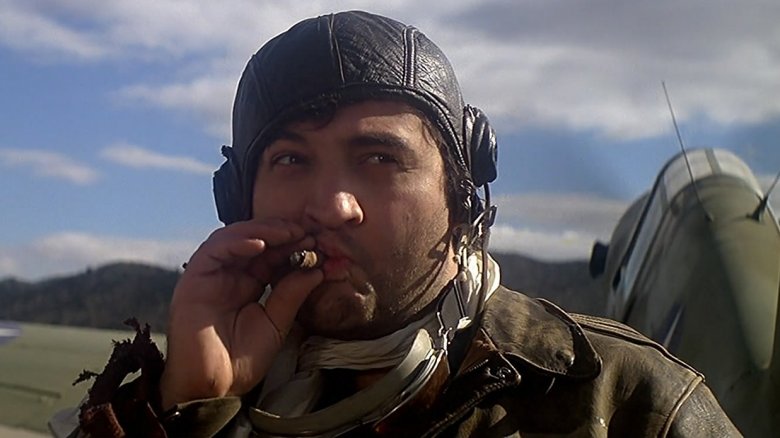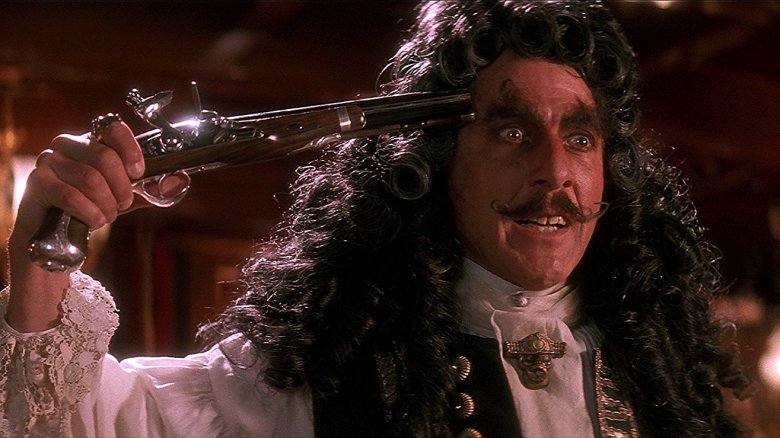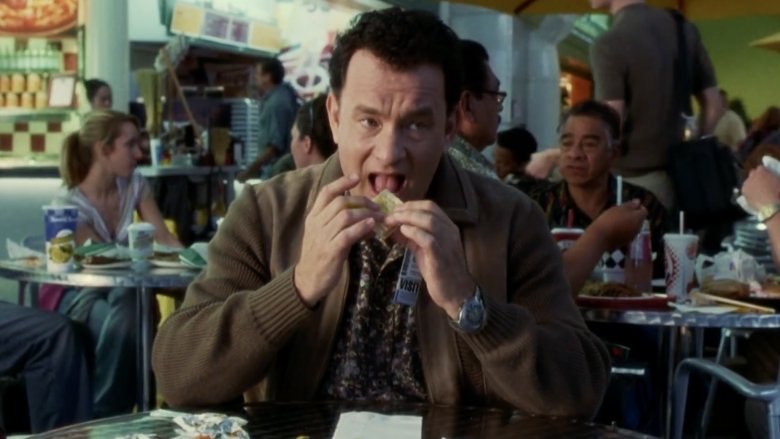Steven Spielberg's 5 Best And 5 Worst Movies
Few filmmakers are regarded with as much admiration as Steven Spielberg. Since breaking into the mainstream more than 40 years ago, Spielberg has put together one of the most impressive filmographies the world has ever seen, one that's seen the director shift from pure popcorn confections to cerebral adult thrillers and family-friendly fluff with singular grace.
That versatility, coupled with his almost unparalleled mainstream instincts, regularly lands Spielberg on lists of the greatest directors of all time. His crowd-pleasing, eclectic filmography has made him the all-time champ at the box office: to date, Spielberg's films have pulled in an astonishing $4.6 billion in U.S. ticket sales alone.
It almost goes without saying, but every new Steven Spielberg project is now considered an "event film" — as well as the latest round in the ongoing debate over whether his latest release stands up to his best work. In the interest of helping you settle your next argument over his career peaks and valleys, here's our rundown of the five best — and five worst — Steven Spielberg movies.
Best: Jaws (1975)
It's endlessly quotable. It's scary as hell. It's one of the most entertaining and re-watchable movies ever produced. It essentially gave birth to the blockbuster movie era — and it was only Steven Spielberg's second feature film. Many would even argue that 1975's giant shark thriller Jaws is still his best.
Even more than four decades after its release, it's all but impossible to challenge that argument. Even if Jaws wasn't one of the most culturally significant films in the history of moving pictures, it would likely earn its place as one of Spielberg's best purely based on its unbridled ambition. We're talking about a big, silly movie that features a giant killer shark, after all. On premise alone, Jaws simply had no business being as good as it was. Couple that silly premise with the film's nightmarish production and the fact that Spielberg was a largely untested 26-year-old when he took the job, and Jaws was the sort of film that should've ruined the careers of everyone involved.
Instead, it made them icons. Spielberg rolled with the proverbial punches on the set, stuck to his unique vision for the film, and delivered his first official masterpiece. From its opening moments, Jaws is all but flawless in its melding of sound, music, and image. The icing on the cake is that Spielberg (behind pitch-perfect performances from Roy Scheider, Richard Dreyfuss, and Robert Shaw) also managed to twist his killer shark tale into a heart-thumping human calamity that'll no doubt continue to captivate (and terrify) moviegoers for generations to come.
Worst: 1941 (1979)
On the heels of the astounding one-two punch of Jaws and its 1977 follow-up Close Encounters of the Third Kind, Spielberg firmly established himself as a visionary new voice in Hollywood. With two bona fide hits to his name, the young director may have started believing his own hype — hence his decision to try his hand a comedy with the screwball war flick 1941.
Of course, Hollywood has a way of humbling even the biggest of stars, and just as Steven Spielberg's star seemed perched, he was met with one of the worst-received films of his career.
Unfolding in the hazy aftermath of the Pearl Harbor attacks, 1941 follows a group of Californians driven to hysterics at the thought of an impending Japanese invasion. If you think that sounds like a questionable setting for a madcap comedy, well... you're right.
Indeed, the biggest problem with 1941 is that — no matter how hard legendary talents like Dan Aykroyd and John Belushi try — it just isn't all that funny. Spielberg further complicates 1941's murky narrative by failing to find any balance between the film's satirical gusto and its big action ambition, and the film crashes and burns at every unexpected turn. Sill, 1941 wasn't a total bust for Spielberg — the film introduced him to a young writer by the name of Robert Zemeckis, and we all know where that friendship would lead.
Best: Raiders of the Lost Ark (1981)
Following the blundering bombast of 1941, Spielberg found himself in the unexpected position of needing a hit to restore his reputation. He'd find inspiration for his next project vacationing with his pal George Lucas, who'd retreated to Hawaii in hopes of avoiding the hoopla around the release of his new film Star Wars.
As the story goes, Lucas pitched the idea of a different sort of action hero while the pair were building a sandcastle. Said hero would be a globetrotting archeologist modeled after those he adored in adventure serials of his youth, and he'd be out to retrieve the Ark of the Covenant in hopes of keeping it out of the hands of occult-obsessed Nazis. Spielberg loved the idea; upon returning to the mainland, the pair sat down with up-and-coming writer Lawrence Kasdan (future scribe of The Empire Strikes Back) to hash out the story, tentatively titled The Adventures of Indiana Smith.
That title would soon change to Raiders of the Lost Ark, and center around the adventures of a character with the more heroic name of Indiana Jones. Played with a mix of bungling, affable charm and gritty gallantry by Harrison Ford, that character became one of the most iconic in the history of cinema. Behind a wildly inventive blend of stylized set pieces, dry, cheeky wit, and a well-informed wink of historical mystery, Raiders of the Lost Ark would claim icon status as well, eventually claiming a spot in the National Film Registry for being "culturally, historically, or aesthetically significant." Not to mention it's still entertaining as hell.
Worst: Always (1989)
After producing/directing some of the biggest films of 1980s, Steven Spielberg was the undisputed king of the blockbuster. He opened the decade with one its highest-grossing films Raiders of the Lost Ark. He might've bookended it with one in 1989's Indiana Jones and the Last Crusade as well — if he hadn't followed it later in the year with the fantastical romance Always.
Released just days before Christmas (and originally scripted by blacklisted scribe Dalton Trumbo), Always tells the story of a daredevil pilot (Richard Dreyfuss) who, after meeting his unexpected end fighting a forest fire, is caught in between heaven and earth, playing spiritual mentor to his unwitting girlfriend (Holly Hunter) and the new hotshot pilot she's falling for (Brad Johnson). While the story aims to stay true to Trumbo's old Hollywood style, Spielberg fails to adjust it for a more modern audience, and the central plot device plays creepy rather than romantic.
In fact, Dreyfuss spends much of the film skulking ominously around the people he loved and interfering in matters that simply no longer concern him because he's dead. Spielberg tries to temper the story's inherent creepiness by heightening its unabashed romanticism; instead, he suffocates the narrative in unabashed sentimentality. In the end, Always is ineffective.
Best: Close Encounters of the Third Kind (1977)
Jaws is the film that put Steven Spielberg on the map, but his 1977 followup proved he deserved to be there. Conceived as a hard science fiction tale of mankind's first contact with an alien species, Close Encounters of the Third Kind saw Spielberg expand his cinematic palette — both conceptually and in terms of sheer scope — to deliver a film that ultimately eclipses Jaws on all fronts.
In spite of a tangled screenwriting process that saw Spielberg wresting sole credit from original writer Paul Schrader, Close Encounters is arguably one of Spielberg's most personal narratives. At the heart of the story is everyman father Roy (Richard Dreyfuss, in what may be his finest performance) who's driven to the brink of sanity after a close encounter of his own — one that sets him off on an odyssey beyond his wildest imagination.
Telling a tale beyond imagination was undoubtedly Spielberg's goal here. Part wrenching family drama, part road movie, and part sci-fi spectacle, Close Encounters remains a bold, stylish, almost flawlessly executed vision of first contact — one unafraid to simultaneously sensationalize, personalize, and intellectualize alien contact by imagining a peaceful encounter rather than the violent invasions of so many other blockbusters. More than any Spielberg film before or after, Close Encounters also proved that the burgeoning superstar director had more on his mind than mindless entertainment.
Worst: Hook (1991)
Of the 31 feature films Steven Spielberg has directed, Hook seems the one he'd most like a do-over on. After all, the warm-hearted tale of forever young Peter Pan learning what it means to grow up fits comfortably inside the director's wheelhouse. Same for the dual narrative that explored the stark differences between a bland real world setting and the magical realm of Neverland. Landing Robin Williams to play an aging Pan was the sort of casting coup that should've made the film an unmitigated hit.
Somehow, the elements that should've made Hook another enchanting, crowd-pleasing triumph for Spielberg ended up working against it. Instead of charming and whimsical, Williams' over the top turn as Peter mostly came across as domineering and at times downright creepy. Equally off-key supporting turns from Dustin Hoffman (Captain Hook) and Julia Roberts (Tinkerbell) were just as dismaying, and the film's depiction of the real world was almost oppressively bleak. Perhaps most surprisingly, Neverland was less than magical, rather looking like half-baked sketches from a high school drama student. Though Hook is buoyed by another marvelous score from John Wililams, it's just an ugly film to look at from start to finish — which will take you two hours and 20 minutes, by the way.
Best: Schindler's List (1993)
After the back-to-back letdowns of 1989's Always and 1991's Hook, Steven Spielberg finally got his groove back in 1993. He got the ball rolling that summer with one of the greatest popcorn flicks ever made in Jurassic Park (also the year's highest-grossing film). He then released his biggest artistic achievement in Schindler's List.
Set in occupied Poland at the height of World War II, Schindler's List tells the agonizing true story of a wealthy German businessman who, after witnessing atrocities committed by Nazis against Polish Jews, goes to extraordinary lengths to save the lives of his Jewish workforce. That story is as harrowing and as heart-wrenching as you'd expect. Spielberg pulls no punches in his depiction of those atrocities, presenting each deplorable act with a sobering pragmatism.
As a result, the film is often quite difficult to watch. It's also virtually impossible to look away from. Behind lavish black and white photography (with one devastating flourish of color), stunning performances from Ralph Feinnes, Ben Kingsley, and Liam Neeson, and an engrossing slow burner of a screenplay from Steve Zaillion, Schindler's List is a film that draws you in with an unfettered sense of intimacy even as it extrapolates on the horrors being perpetrated by Nazis throughout Europe.
That Schindler's List never feels overly sentimental, manipulative, or even melodramatic is no small feat. That it still feels as artistically ambitious and culturally relevant today as it did when it was relwased is a testament to the skill and passion that went into its making — skill and passion that ultimately netted Spielberg his first Academy Award for Best Director.
Worst: The Lost World: Jurassic Park (1997)
Again, Jurassic Park was the highest-grossing film of 1993. That's the sort of success that leads producers to greenlight a sequel to a project that doesn't necessarily need one — and Steven Spielberg should've known better than to step into the director's chair for The Lost World: Jurassic Park.
Spielberg had already made a similar misstep with the first Raiders of the Lost Ark sequel, Indiana Jones and the Temple of Doom, a film he'd later deem "too dark, too subterranean, and much too horrific." Alas, he was doomed to repeat history and deliver an utterly forgettable sequel to another beloved original.
It's hardly a secret why The Lost World didn't work. Jurassic Park inspired nothing short of genuine awe in its groundbreaking depiction of larger-than-life dinosaurs brought back from extinction. The Lost World — and really every unnecessary Jurassic Park sequel since — doesn't even come close to matching the awe-inspiring spectacle of that original. It certainly doesn't help that the film's characters never feel like anything but types — and that wannabe King Kong finale with a T-rex wreaking havoc on the mainland is derivative and downright silly. In other words, the perfect finale for this disappointing sequel.
Best: E.T. the Extra-Terrestrial (1982)
The early '80s proved a particularly fruitful period for Steven Spielberg. He'd already delivered one of the biggest films of his career with 1981's Raiders of the Lost Ark, but he was about to follow that film up with another iconic addition to his oeuvre in E.T. The Extra-Terrestrial.
As it happens, Spielberg and screenwriter Melissa Mathison started developing this tale of a young boy's friendship with a lovable alien during downtime on Raiders. That may come as a bit of a surprise, considering the films appear to have little in common thematically. Still, those of us who were watching closely couldn't help but notice that both are rife with classic Spielberg themes like fractured families, absentee fathers, extraterrestrial (or supernatural) elements triggering real world events, and of course that most Spielbergian of themes, human alienation.
From those familiar elements Spielberg crafts an intensely personal narrative, but one that's also proved easily accessible to moviegoers. Upon release, E.T. found its way into the hearts and minds of moviegoers from all age groups and all walks of life. The film eventually pulled in close to $800 million in worldwide box office. Unbridled adoration from audiences aside, E.T. remains a breathtaking mix of art, heart, and unabashed entertainment that satisfies emotionally as much as it does intellectually. Even four decades after its release, E.T. remains one of Spielberg's most beloved works, and may well stand as the greatest family film ever made.
Worst: The Terminal (2004)
When Spielberg is at his best, his films boast entertaining narratives, relatable characters, and awe-inspiring imagery. At his worst, they're suffocated by sentimentality. The tricky thing about Spielberg's 2004 romantic dramedy The Terminal is that you can't quite tell if it's the director at his best or worst until about halfway through, which makes it one of the director's most frustrating films.
Much of that frustration stems from the fact that The Terminal has a fascinating, politically subversive setup that might've proved quite compelling in post-9/11 America. It follows a kind-hearted Eastern European man forced to take up residence in New York's JFK Airport after the mid-flight collapse of his country's government. In today's world, a man without a country is a man without valid papers, which means he's not legally permitted to set foot in the U.S..
Again, it's a fascinating setup, with all the makings of a biting political satire. While Spielberg flirts with politics throughout, he hijacks The Terminal's subversiveness with an absurd romantic subplot that leaves the film floundering. The Terminal doesn't fizzle because of misguided political intrigue, or its amiable romantic ambitions. It fizzles because it's trying so hard to do both things at once, and failing on both counts. In the end, The Terminal feels like a film without a clear destination. That you can't fully recognize the fact until an hour into the action just adds insult to injury.



